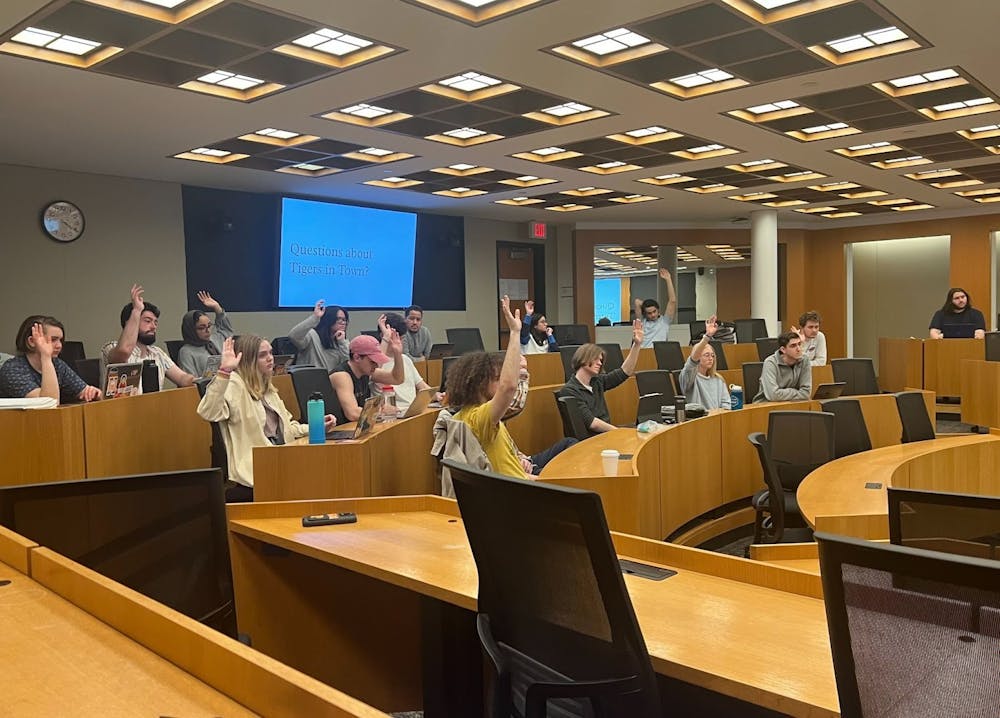With several members referencing rampant disruptions caused by campus construction, USG members brainstormed how to encourage students to congregate outside. USG President Stephen Daniels ’24 suggested that USG could finance a tent for students to use. Other suggestions included more chairs, the introduction of hammocks, greater utilization of Poe Field, and more outside tables near dining halls including at RoMa and Whitman.
This discussion was just one part of a packed USG meeting in which the senate previewed a slew of new student programs and hinted at a mysterious referendum on the horizon without revealing the subject.
Tigers in Town, the program started during the COVID-19 pandemic in which University groups partner with local stores to allow students to pick up food, was renewed unanimously. The program was presented by Isabella Sibaja ’26 and Genevieve Shutt ’26. Shutt’s sister, Isabella Shutt ’24, served as a point person for Tigers in Town in 2022 as Campus and Community Affairs (CCA) chair. G. Shutt and Sibaja emphasized “encouraging engagement with local businesses and taking breaks from on-campus stress” as benefits of the program.
This semester, the program is to be phased into two parts. Farmers in the Market, the first of the two parts, is a program in which students can get a $5 voucher to use at one of 11 available vendors in Firestone Plaza. These vendors are in accordance with the Office of Sustainability guidelines, meaning they are fifteen minutes or less away from campus by car and “fought … to promote sustainable processes.”
The markets will be in Firestone Plaza on Wednesdays from 11 a.m. to 3 p.m. from April 12 to May 3. During its four-week run, each class year will have a designated week to participate — a feature newly introduced this year. Sponsors expected 600 participants in total (150 per week).
Daniels asked for clarification on ticket distribution: “Will there be some period of time where if we don’t fill up for a certain class, students from any classes can use those tickets?”
G. Shutt suggested that extra tickets were unlikely, citing the high turnout for the event last year. Shutt said that she believes the class year model will alleviate some of the problems the program encountered last year.
“From people in the market last year it was roughly 375 students that they reached,“ G. Shutt said, “[Vendors] ran out within less than an hour, and there was a really long line.”

The sponsors also introduced a second Tigers in Town program: “Tigers Feast in Town.” The program is in partnership with Porchfest, a “walkable music festival in the town of Princeton, where neighbors offer their front porches as concert venues.” Students need to visit two porches to receive two stamps. The first 500 students to do so will earn an $8 voucher for food at the event.
“It’s probably one of the biggest events that bring together the University and the local community,” said Sibaja.
Following up on last year, the program hopes to host a porch composed of Princeton student performers, the budget proposal for the event is estimated to be $8,439.
Though Sibaja acknowledged that the event did not have a high turnout in 2022, she pointed to signs of increased interest for this year. For example, Sibaja noted that there was triple the number of applications from prospective student performers.

In 2022, Porchfest coincided with spring Lawnparties, curbing student turnout. Daniels expressed that, with this scheduling conflict resolved, “There’s a pretty strong argument that the turnout is going to be much higher this year.”
Following up on conversations earlier in the year, the USG also conducted a review of Mental Health Week which takes place from March 27 to April 2, based on a presentation by Class of 2024 Senator Noah Luch. Luch noted how the Mental Health Week only cost USG $750, a “nice surprise” due to collaboration with other groups on campus.
In the run-up to spring elections, election officials alerted the Senate about a new undisclosed referendum. Following the referendum sponsor’s draft resolution, the board will vote on if the referenda in question are “properly structured” and “meets all the criteria that then can go to the student body.” Senate referenda language review will also be held at the upcoming USG meeting.
The USG is one year out from Referendum 3, a controversial referendum that called on the University to disassociate from the Caterpillar construction company. Due to a contested election result, the referendum drew national attention and occupied USG's attention for weeks.
The USG also assessed last week’s March Madness watch party. 745 students attended the March Madness event with the members noting that after its primary location at Whig Hall had reached capacity, a second watch party was set up in McCosh 10, which also reached capacity.
At the meeting, it was revealed the watch party was not held in Jadwin because no trained staff were able to operate the Jumbotron, the large display at Jadwin. One member of the Senate asked if there was a way for more students to be trained in the technology to avoid reliance on others in the event of festivities like this.
“I agree that we should ideally, going forward, be able to secure a better space that has more room so that we can better address any accessibility concerns. There’s a pretty strong argument that we can do events like this, and the student body is going to show,” Daniels said.
Justus Wilhoit is an assistant News editor for the ‘Prince.’
Please direct any corrections requests to corrections[at]dailyprincetonian.com.
Correction: A previous version of this article referred to Daniels incorrectly and suggested that students currently operate the Jumbotron, when it is actually staff. The ‘Prince’ regrets these errors.








